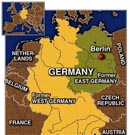Turks swell with pride at Frankfurt literature show
 Frankfurt - Turks living in Germany could barely contain their excitement as both their presidents - Abdullah Gul of Turkey and Horst Koehler of Germany - together admired an exhibition about 20th-century Turkish literature.
Frankfurt - Turks living in Germany could barely contain their excitement as both their presidents - Abdullah Gul of Turkey and Horst Koehler of Germany - together admired an exhibition about 20th-century Turkish literature.
Turkey was guest of honour this week at the Frankfurt Book Fair, and many who have felt for so long like an underclass in their adopted home, Germany, were deeply moved at this homage to the best writing in the Turkish language.
On Wednesday, the book fair's first day, some wanted to record the moment for posterity, jostling to get closer and holding camera-phones over their heads to snap pictures as the two presidents walked past.
Sebnem Isiguzel, 35, a visiting novelist, related what a local Turkish taxi-driver told her as he drove her into Frankfurt the previous day: "I'm so proud to have a famous writer in my cab, and proud that you're a woman, and proud as well that you are Turkish."
One of Isiguzel's racy and humorous novels - the German title translates more or less as "On the Margins" - has already appeared in German translation, and another, "Parade," satirizing Turkey's political class, is coming out in German translation soon.
There has been bitter criticism this week by German intellectuals of Turkey's human-rights record.
But when Turkish authors assail their nation's laws and policies, a love of country mostly shines through.
"The true voice of a country speaks through its literature, not through awful politicians or generals," said Isiguzel, gleefully recalling the inaugural speech to the Book Fair by Orhan Pamuk, the
2006 winner of the Nobel Prize for Literature.
In sorrow rather than anger, Pamuk criticized a law that makes it a crime to insult Turkey and complained that access to websites such as YouTube is blocked by Turkish internet providers. Gul was among the listeners.
"He was feeding them their nasty-tasting medicine, spoonful by spoonful," said Isiguzel admiringly, while speaking in the same breath of her devotion to her country.
"I write novels," she said with a smile, "to make my fellow-country-people happy."
For the guest-of-honour programme at the book fair, Turkey has sent not only leading authors to Frankfurt, but also artists, actors and musicians to demonstrate the best of Turkish arts to German audiences.
Cihan Aktas, another author from Turkey, attended a grand performance of the Yunus Emre Oratorium by Ahmet Adnan Saygun. She described in an interview how she got into conversation with an ethnic Turkish youth sitting near her. He had grown up in Germany.
"He told me this: A few years ago, the Turks setting foot in that concert hall would have been more likely to be cleaners than audience. Today, much of the audience was Turkish. It's a telling index of how far we have travelled," she said.
The German media have run special articles on Turkish intellectual life in the run-up to the fair and offered a platform to Turkish intellectuals living in Germany by interviewing them.
One of the most remarkable book launches at the fair Wednesday was the book, "Super Friends: What Turks and Germans Really Think."
It was jointly published by two newspapers, Bild of Germany, which often offers headlines that seem hostile to Turks, and Hurriyet of Turkey, which in the same measure relishes a bash at the Germans.
As a kind of peace offering, the editors of the two mass-circulation dailies persuaded 26 German and Turkish celebrities, including Chancellor Angela Merkel of Germany, to contribute to the book, writing paeans of friendship to the other ethnic group.
It may not be a permanent change in the relationship, but it may signal a willingness by both to lard future criticism of one another with praise where it is due. (dpa)